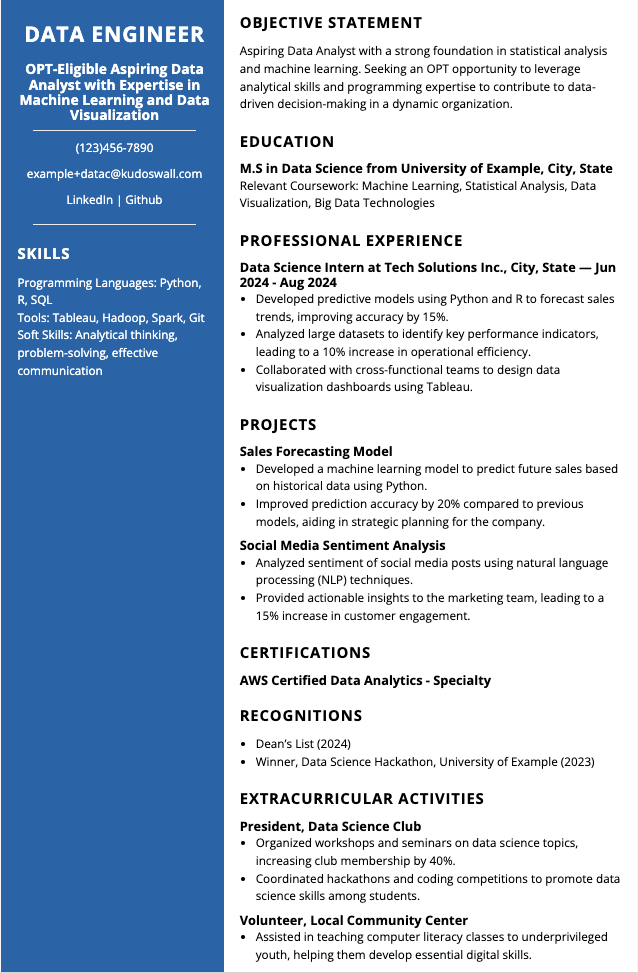Aspiring Data Engineer Resume Example for OPT Students
Begin your career in data engineering or kickstart your journey on OPT in the USA with a well-structured resume. Highlight your technical skills, hands-on projects, and educational background effectively to stand out as an entry-level data engineer.

Click the Image to Build Your Resume
Key Features of This Aspiring Data Engineer/OPT Resume
- Technical Skills: Proficient in Python, SQL, and data analysis tools like Pandas and NumPy, essential for both data engineering and OPT job roles.
- Education: Bachelor's degree in Computer Science, with coursework in data structures, machine learning, and databases. Ideal for students pursuing OPT in STEM fields.
- Projects: Completed hands-on projects including data analysis for a real-world dataset and a machine learning model deployment.
- Certifications: Data Engineering on Google Cloud Platform, useful for enhancing your OPT resume.
Possible Interview Questions for an Aspiring Data Engineer Role
- What academic projects have prepared you for a data engineering career?
- How do you approach learning new tools or technologies?
- Explain your understanding of ETL processes.
- What programming languages are you comfortable with, and how have you used them?
- Describe a data pipeline project you worked on and its outcomes. Prepare for Your Interview with AI
Frequently Asked Questions (FAQ)
1. What should an aspiring Data Engineer include on their resume?
Focus on academic projects, internships, certifications, and foundational skills like Python, SQL, and data processing tools.
2. Are certifications necessary for aspiring Data Engineers?
Certifications such as Azure Data Fundamentals, AWS Data Analytics, or Google Cloud Data Engineer can help demonstrate your technical knowledge.
3. How can I compensate for a lack of professional experience?
Highlight academic projects, self-learning initiatives, and any relevant internships to show your potential and commitment to the role.
4. What tools should I learn as an aspiring Data Engineer?
Start with tools like SQL, Python, Hadoop, and Spark. Familiarity with cloud platforms like AWS or Azure is also beneficial.
5. What industries hire entry-level Data Engineers?
Industries like finance, healthcare, e-commerce, and technology are common employers for aspiring Data Engineers.
6. What is the best resume format for freshers specializing in Data Engineering?
The best resume format for freshers specializing in Data Engineering is the reverse-chronological format. This format emphasizes your educational background, technical projects, internships, and relevant skills, making it ideal for showcasing achievements even with limited work experience. Key sections to include are:
- Contact Information: Include your name, phone number, email, and LinkedIn/GitHub profiles.
- Objective or Summary: Craft a concise statement highlighting your passion for data engineering and technical expertise.
- Education: Mention your degree, institution, and any relevant coursework in databases, big data, or data warehousing.
- Technical Skills: List programming languages (Python, SQL, Java), big data tools (Hadoop, Spark), and database systems (MySQL, PostgreSQL).
- Projects: Highlight key data engineering projects, such as building ETL pipelines, working with cloud platforms (AWS, Azure, GCP), or designing data warehouses. Include technologies used and measurable outcomes.
- Internships: If applicable, include internships focused on data engineering tasks, such as data migration, pipeline optimization, or database management.
- Certifications: Add certifications like AWS Certified Data Analytics, Google Professional Data Engineer, or Databricks Certified Data Engineer Associate.
- Achievements: Mention hackathons, coding competitions, or research papers related to data engineering or data analytics.
To make your resume ATS-friendly, use clear formatting and include relevant keywords such as 'ETL pipelines,' 'data warehousing,' and 'big data tools.' If you need assistance creating a polished resume, try our AI Resume Builder tailored for freshers in Data Engineering.
7. Where can I find a sample cover letter for entry-level Data Engineers?
Here is a complimentary cover letter for data engineer freshers: Data Engineer Fresher Cover Letter Example .
Find Your Resume Score
Analyze your resume and get actionable feedback on how to improve your resume score and pass ATS filters.
Check Your ScoreBuild Your Resume
Create a professional resume with our easy-to-use AI resume builder. Choose from templates and customize your resume to land your dream job.
Start BuildingPrepare for Interviews
Get ready for your next job interview with our AI-powered interview preparation tool. Practice common questions and get real-time feedback.
Start PreparingExplore more resources and career guides for data-centric roles.
Visit Data Professionals Hub